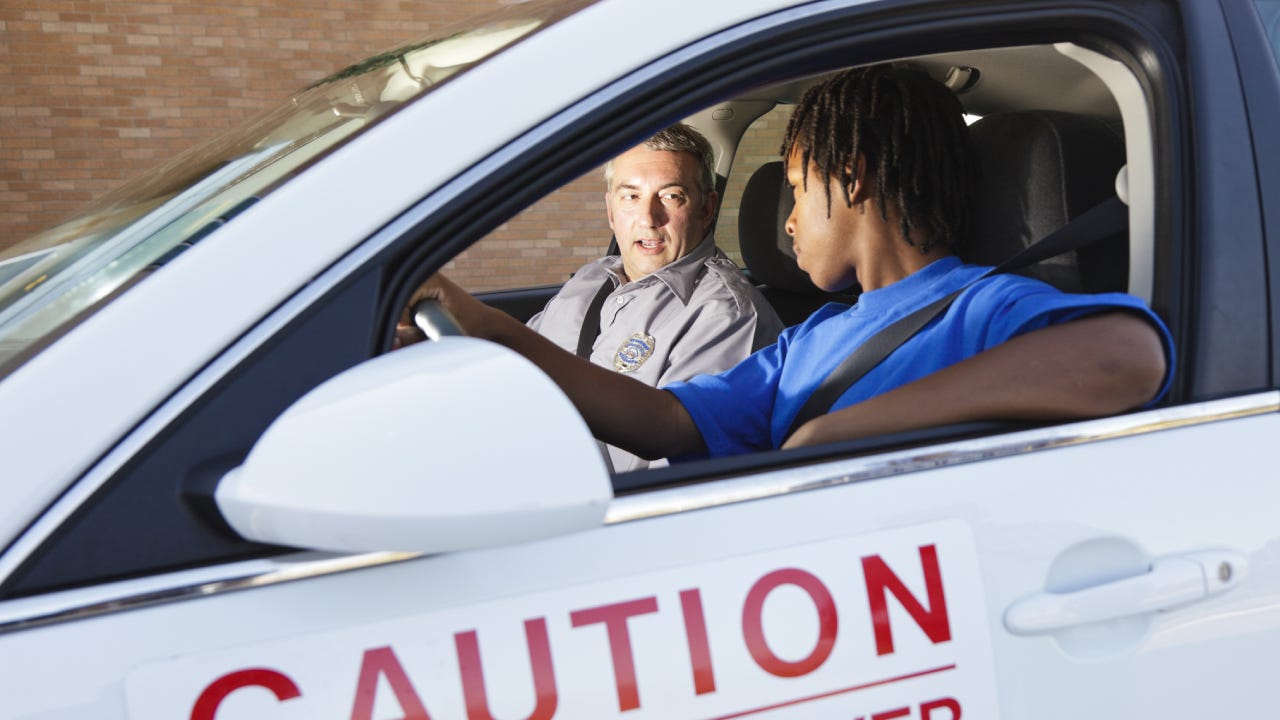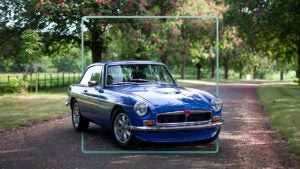Can you get car insurance with a learner’s permit?

Key takeaways
- Insurance companies usually want drivers with a learner’s permit added to an insurance policy to know what risk exists in a household.
- Permitted drivers may not increase insurance costs if added to a policy, but costs may increase significantly once they obtain their driver’s license.
- A permitted driver may get their own policy in some cases, but eligibility can depend on the permitted driver’s age and insurance carrier’s criteria.
Most life milestones are a cause for celebration. However, there is one milestone that may fill parents with dread — when their child gets their driver’s license. Having a teen behind the wheel can be anxiety provoking for parents, plus adding a new driver to your car insurance is one of the most expensive policy changes you can make. Fortunately, while your child has a learner’s permit, it might not be as bad as you think. Even though permitted drivers can usually only drive with another licensed adult in the car, understanding if and how your car insurance policy covers learning drivers can give you peace of mind and help you plan for when your child is fully licensed.
Car insurance for learning drivers
Car insurance follows the vehicle, and since new drivers have little driving experience, it is vital for any car they drive to be properly insured. According to data from the Insurance Institute for Highway Safety (IIHS), teenagers behind the wheel are four times more likely to crash than drivers ages 20 or older. Thus, policy coverage for inexperienced drivers is crucial.
A learner’s permit is a provisional or limited license given to someone who is still learning the ropes and working to obtain a full driver’s license. Learner’s permits are often issued to younger drivers, and most states allow you to get your learners permit six months before the legal licensing age. In order to acquire a learner’s permit, drivers must pass either a written test, a proficiency test on the road or a combination of the two.
Does it cost more to add a driver with a learner’s permit to an auto policy?
Adding a newly licensed driver to your policy can drastically increase the cost of your car insurance, but adding a driver with only a learner’s usually only causes a small increase, if you see one at all.
When insurance companies rate auto policies, one factor they consider is household exposure. This is why many carriers request that all household residents over the age of 14 be listed in the policy, even if they can’t drive yet. Household members with their own insurance policies or who are too young to drive are typically listed as non-drivers or inactive drivers. Even though non-drivers do not individually impact the policy rate, this practice lets the insurer know who in the house has permissive use of the vehicle.
In most cases, adding a driver with a learner’s permit will not increase the rate of your auto policy, but Zack Adams, a licensed insurance agent for one of the largest national auto carriers, says this has changed over the past few years: “Household exposure has a much more significant impact now. I have been an agent for 14 years, and more and more, I see permitted drivers impacting rates when they are added to the policy, and they didn’t before.”
Adams says the cost of adding a permitted driver is much less than adding an inexperienced, fully listened driver. Learner’s permits have guardrails in place to help the new driver learn good driving behaviors and reduce the chances of causing an accident. Rules vary between states, but they usually include needing another licensed adult in the vehicle when driving, no children allowed in the car and limitations on nighttime driving.
How much does car insurance cost with a learner’s permit?
When a young person becomes a fully-fledged driver with a Class D driver’s license, the guardrails are off. Since insurers are assuming more risk, they charge accordingly.
The big rate hike parents worry about happens when a new driver moves from a learner's permit to a driver's license.— Zack Adams, Licensed insurance agent
Once a driver with a learner’s permit obtains their driver’s license, rates will usually increase. If a new driver can obtain their own insurance policy, insurance costs for younger drivers can be high until they gain experience over time. However, teen drivers can save money by being added to their parents’ policy instead. Teens who share the family vehicle may be considered occasional operators, which are typically rated much lower than teens who are the primary operators of their own cars.
Rate increases for permitted drivers vary between states, carriers and policy types, but the average cost of full coverage insurance for a 16-year-old driver with a driver’s license while on their parents’ policy is $5,229 per year or $436 per month. Aside from the few states that restrict or prohibit the use of age and/or gender for rating purposes, female teens tend to pay less for car insurance, and both males and females can see lower rates as they gain driving experience.
Cost of car insurance for teens on their parents’ policy by gender
| Age | Males | Female |
|---|---|---|
| 16 year-old drivers | $5,414 | $5,043 |
| 17 year-old drivers | $5,020 | $4,665 |
| 18 year-old drivers | $4,671 | $4,331 |
| 19 year-old drivers | $4,097 | $3,770 |
| *Rates reflect the total cost for two adult drivers, one teen and one vehicle |
Drivers under the age of 18 are not able to purchase their own insurance policy since they aren’t legally old enough to agree to an insurance contract. Once they become adults, they can remain on their parents’ policy as long as they still live in the same household. Adult children looking for financially savvy ways to save money may want to consider staying on their parents’ policy for as long as they can.
Average cost of car insurance for teen drivers on their own policy versus parents’ policy
| Age | Avg. cost on their own insurance policy | Avg. cost on their parents’ insurance policy | Cost difference |
|---|---|---|---|
| 18 | $6,687 | $4,501 | +49% |
| 19 | $5,445 | $3,933 | +38% |
How do I add a driver with a learner’s permit to my car insurance policy?
To add a permitted driver to your insurance policy, you will want to contact your insurance carrier and provide some information about the new driver. Depending on your carrier, they may take down the information or advise you to call them back once your child has a valid license, which is what Bankrate reporter Karen Bennett experienced when adding her kids to her insurance policy.
When my kids were taking driver's education and had learner's permits, our auto insurance agent said we didn't need to purchase policies for them until they actually obtained their licenses. In the meantime, they were covered under our family's policy while they drove under my and my husband's supervision— Karen Bennett, Senior consumer banking reporter
Most insurance experts recommend checking in with your carrier once your child gets their permit to make sure they’re covered without a formal policy change. You may still be asked to provide some basic information about the new driver. This varies by carrier and state, but likely includes your child’s name, date of birth and learner’s permit number along with your policy information.
Once your child is formally licensed, you will need to provide their license number and likely some information about their driving habits to add them to your policy. Your insurance carrier may run the license information before the policy renewal and update the driver from permitted to licensed, which may trigger a premium increase on your policy.
What discounts are available for drivers with a learner’s permit?
Once a young driver gets their license, you will likely see the cost of your insurance increase, and in many cases, substantially. For example, adding a 16-year-old licensed driver to their married parents’ policy increases average car insurance premiums by $245 a month. To offset rate increases, check with your insurer about discounts for young drivers. A few of the most common discounts for young drivers are:
- Good student discounts: If the young driver maintains a certain GPA, they might qualify for this discount. In many cases, teen drivers who are full-time students and maintain at least a B average in school can earn a discount.
- Driver education discounts: If young drivers complete a certified driving program, they may earn discounted premiums. For example, Allstate gives discounts to teen drivers who qualify.
- Distant student discounts: These are available through certain carriers for students who live 100 miles or more away from school and will not keep a car on campus.
- Telematics programs: Since younger drivers often face higher rates due to inexperience, a telematics discount may help offset the cost of coverage. These programs are available through many major insurance carriers and track safe driving habits using an app or plug-in device. If a driver practices consistently safe habits, they may be eligible for a discounted premium.
Frequently asked questions
Methodology
Bankrate utilizes Quadrant Information Services to analyze November 2024 rates for all ZIP codes and carriers in all 50 states and Washington, D.C. Rates are weighted based on the population density in each geographic region. Quoted rates are based on a single, 40-year-old male and female driver with a clean driving record, good credit and the following full coverage limits:
- $100,000 bodily injury liability per person
- $300,000 bodily injury liability per accident
- $50,000 property damage liability per accident
- $100,000 uninsured motorist bodily injury per person
- $300,000 uninsured motorist bodily injury per accident
- $500 collision deductible
- $500 comprehensive deductible
To determine minimum coverage limits, Bankrate used minimum coverage that meets each state’s requirements. Our base profile drivers own a 2022 Toyota Camry, commute five days a week and drive 12,000 miles annually.
These are sample rates and should only be used for comparative purposes.
Age: Rates were calculated by evaluating our base profile with the ages 16-40 (base: 40 years) applied. Depending on age, drivers may be a renter or homeowner. Age is not a contributing rating factor in Hawaii and Massachusetts due to state regulations.
Gender: The following states do not use gender as a determining factor in calculating premiums: California, Hawaii, Massachusetts, Michigan, North Carolina, Pennsylvania.
Why we ask for feedback Your feedback helps us improve our content and services. It takes less than a minute to complete.
Your responses are anonymous and will only be used for improving our website.
You may also like

How to choose the best car insurance company

Car insurance for high-risk drivers in New York

Can you get insurance with a suspended license?

Can you get car insurance without a license?


